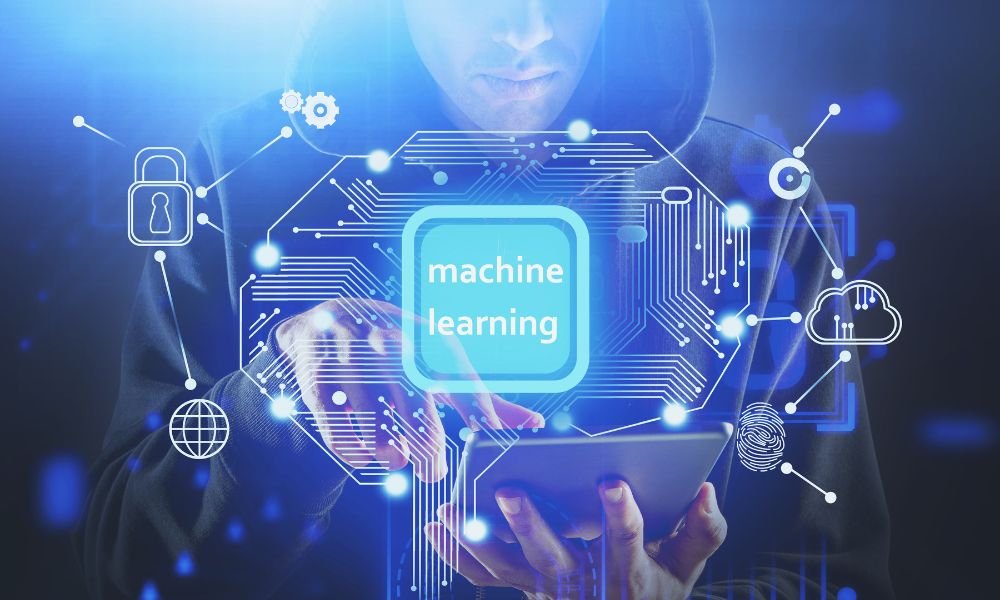Artificial Intelligence
Master skills like Python, Exploratory Data Analysis, Machine Learning Algorithms, Natural Language Processing, Deep Learning, and Computer Vision.
Gain hands-on experience with industry-relevant tools and technologies.
Learn from experienced professionals and industry leaders.
Participate in interactive sessions and collaborative projects.
Receive personalized mentorship and career guidance.
Get certified and enhance your resume with a recognized qualification.
Course Duration : 100 days
Overview
Our AI Course introduces you to the concepts, tools, and applications of Artificial Intelligence. This comprehensive course covers:
- Exploratory Data Analysis: Learn to analyze datasets effectively.
- Machine Learning Algorithms: Understand and implement various ML algorithms.
- Natural Language Processing: Dive into the world of NLP.
- Deep Learning: Master advanced neural network techniques.
- Computer Vision: Explore the techniques to process and analyze visual data.
- Real-Time Projects: Gain hands-on experience by working on real-world projects.
Join us to master AI and stay ahead in the technological race!
Key Highlights
- One-on-One with Industry
- Expert Guidance
- 1:1 Mock Interview
Who Can Apply?
- Individuals with a bachelor’s degree keen to learn AI.
- IT Professionals looking for career transition as AI Engineers.
- Students and researchers interested in AI technologies.
- Business executives and managers who oversee data-intensive projects.
- Developers and Project Managers.
Curriculum
Python Programming and Logic Building
I Will Prefer The Python Programming Language. Python Is The Best For Starting Your Programming Journey. Here Is The Roadmap Of Python For Logic Building.
Introduction And Basics
- Installation
- Python Org, Python 3
- Variables
- Print Function
- Input From User
- Data Types
- Type Conversion
- Why Python For Data Analysis And Data Science
- How To Install Anaconda
- Running Few Sample Programs Using Python
Operators
- Arithmetic Operators
- Relational Operators
- Bitwise Operators
- Logical Operators
- Assignment Operators
- Compound Operators
- Membership Operators
- Identity Operators
Conditional Statements
- If Else
- If
- Else
- El If (Else If)
- If Else Ternary Expression
While Loop
- While Loop Logic Building
- Series Based Questions
- Break
- Continue
- Nested While Loops
- Pattern-Based Questions
- Pass
- Loop Else
Lists
- List Basics
- List Operations
- List Comprehensions / Slicing
- List Methods
Strings
- String Basics
- String Literals
- String Operations
- String Comprehensions / Slicing
- String Methods
For Loops
- Range Function
- For Loop
- Nested For Loops
- Pattern-Based Questions
- Break
- Continue
- Pass
- Loop Else
Functions
- Definition
- Call
- Function Arguments
- Default Arguments
- Docstrings
- Scope
- Special Functions Lambda, Map, And Filter
- Recursion
- Functional Programming And Reference Functions
Dictionary
- Dictionaries Basics
- Operations
- Comprehensions
- Dictionaries Methods
Tuple
- Tuples Basics
- Tuples Comprehensions / Slicing
- Tuple Functions
- Tuple Methods
Set
- Sets Basics
- Sets Operations
- Union
- Intersection
- Difference And Symmetric Difference
50+ Coding Ǫuestions Practice And Assignments
Python With Data Science
- Numpy
- Pandas
- Matplotlib
- Seaborn
- Sklearn
Data Visualization Using Matplotlib And Seaborn
- Introduction To Matplotlib
- Basic Plotting
- Properties Of Plotting
- Sub Plots
- Line Plots
- Pie Chart
- Bar Graph
- Scatter Plot
- Histograms
- Box Plots
- Violin Plots
- Dist Plots
- Dis Plots
- Kde Plots
Exploratory Data Analysis (Eda) With Dataset
- Uni-Variate Analysis
- Bi-Variate Analysis
- Multi-Variate Analysis
R Programming
- Managing Data Frames With The Dplyr
- Package
- Control Structures
- Functions
- Lexical/Dynamic Scoping
- Loop Functions
- Debugging
- Data Visualization In R
- Storytelling With Data
- Principle Tenets
- Elements Of Data Visualization
- Infographics Vs Data Visualization
- Data Visualization & Graphical Functions In R
- Plotting Graphs
- Customizing Graphical Parameters To Improvise The Plots
- Various Guis
- Spatial Analysis
- Other Visualization Concepts
Machine Learning Algorithm’s
Python Supports N-Dimensional Arrays With Numpy. For Data In 2 Dimensions, Pandas Is The Best Library For Analysis. You Can Use Other Tools But Tools Have Drag- And-Drop Features And Limitations. Pandas Can Be Customized As Per The Need As We Can Code Depending Upon The Real-Life Problem
1. Stastistics And Maths
Types Of Variables
- Nominal/Categorical
- Ordinal
- Interval/Ratio
- Continuous, Time Series
Central Tendency
- Mean
- Median
- Mode
- Interquartile Mean
2. Measures And Statistical Difference
- Variance
- Correlation
- Standard Error
- Iqr
- Range
- Mean Absolute Difference
- Median Absolute Deviation
- Skewness
- Kurtosis
- Correlation And Auto Correlation And Correlation Matrix
- Correlation Ratio
3. Hypothesis Testing
- Chiquare
- Z Test
- T Test
- Anova
- P Value
- Beta Test
- F Score
Data Preprocessing And Feature Engineering
1. Methods Of Imputation
- Mean
- Median
- Mode
- B-Fill
- F-Fill
- Knn Imputation
- Random Forest Imputation
- Regressor Based Imputation
2. Encoding
- Label Encoding
- Dummy Encoding
- Effect Encoding
- Binary Encoding
- Hash Encoding
- Base N Encoding
3. Feature Scaling
- Standardization
- Normalization
4. Handling With Outliers
- Z-Score
- Iǫr
- Percentil
5. Supervised Learning Regression
- Linear Regression
- Polynomial Regression
- Classification
- Naïve Bayes
- Logistic Regression
- Knn
- Decision Tree Svm
6. Unsupervised Learning
- K-Means
- C-Means
- Pca
- K-Means
- C-Means
- Pca
7. Ensemble Models
- Random Forest Classifier
- Random Forest Regressor
- Ada Boost Classifier
- Ada Boost Regressor
- Xg Boost Classifier
- Xg Boost Regressor
- Cat Boost Classifier
- Light Gbm
- Gradient Boost Classifier
- Gradient Boost Regressor
- Voter Classifier
- Stacking
- Customised Ensemble Models
8. Metrics
- Classification Report
- Confusion Matrix
- Accuracy Score
- Crosstab
- Fi-Score
- Precision
- Recall
- Roc Curve
- R Squared And Adjusted R Squared
- Rmse, Mse
- Evaluation Metrix
9. Over Sampling And Under Sampling
- Random Over Sampling
- Random Under Sampling
- Smote Over Sampling
- Smote Under Sampling (Knn,Svm,Clustering)
- Random Over Sampling
- Random Under Sampling
- Smote Over Sampling
- Smote Under Sampling (Knn,Svm,Clustering)
10. Cross Validation
- K-Fold Cross Validation
- C-Fold Cross Validation
11. Hyper Parameter Tuning
- Grid Search Cv
- Randomized Cv
- Optuna
Natural Language Processing
Text Processing
- Raw Text
- Noise Entity
- Removal Stop
- Word
- Punctuations
- Text Normalization
- Urls
- Numbers
- Word
- Normalization
- Tokenization
- Stemming
- Lemmatization
- Word
- Standardization
- Regular Expression
- Modified Text
- Feature Engineering
- N-Grams
- Bag Of Words Count Vectorizer
- Tfidf
- Gensim
- Word2vec
- Topic Modeling
- Lda
- Parts Of Speech Tagging
- Dependency Parsing
- Constituency Parsing
- Named Entity Recognition
- Fuzzy Search
- Sentiment Analysis
- Spacy
- Text Blob
Deep Learning
- Neural Networks
- Min, Max, Mean Pooling
- Padding
- Basic Neural Network
- Perceptron
- Feed Forward Neural Network
- Back Propagation
- Ann
- Cnn
- Rnn
- Gan
Computer Vision
Gen AI
Projects
- Live Kaggle Competition
- Hands On Experience On Datasets
- End To End Unique Projects
- LLM Models
Corporate Training
We give Corporate Employees the Training They Need to Learn & Lead
Details
Flexible Timings
36 Hours Training
Certification
24/7 Support
Why Pursue a Career in Artificial Intelligence?
High Demand: Artificial Intelligence Engineers are in high demand across industries due to the exponential growth of AI Technology and the need for skilled individuals to manage and analyze it effectively.
Lucrative Salaries: Careers in AI offer competitive salaries and opportunities for advancement, reflecting the critical role these professionals can command High salaries for their skills.
Diverse Opportunities: The skills learned from AI Course can be applicable in many roles like AI Engineer/Developer, Machine Learning Engineer, Computer Vision Engineer, Data Scientist etc.,
Diverse Applications: Every day Artificial Intelligence is applicable across various domains, including e-Commerce, AI Assistants, Navigation Technology, Robotics, Health Care and many more.

Student Success Stories
Frequently Asked Questions
What are the key technologies covered in AI course?
A comprehensive AI course typically covers technologies such as Python, EDA, ML Algorithms Natural Language Processing, Deep Learning etc.,
How will hands-on experience benefit me in AI career?
Hands-on experience with tools like Python, EDA, ML Algorithms allows you to apply theoretical knowledge to real-world scenarios, gaining practical skills crucial for solving real time AI challenges in industry.
What are the prerequisites for enrolling in an AI course?
Prerequisites generally include basic programming skills, and a strong interest in working with large datasets and data analytics.
How can AI certification boost my career prospects?
Artificial Intelligence is undoubtedly an Outstanding Career with a vast scope, so having recognized AI certification demonstrates your proficiency in handling large datasets and using industry-standard tools, making you a more competitive candidate for roles in data analytics, data engineering, and related fields.
Related Courses

Data Science
Buy for ₹30,000

Generative AI
Buy for ₹30,000

Machine Learning
Buy for ₹20,000

Deep Learning
Buy for ₹20,000
